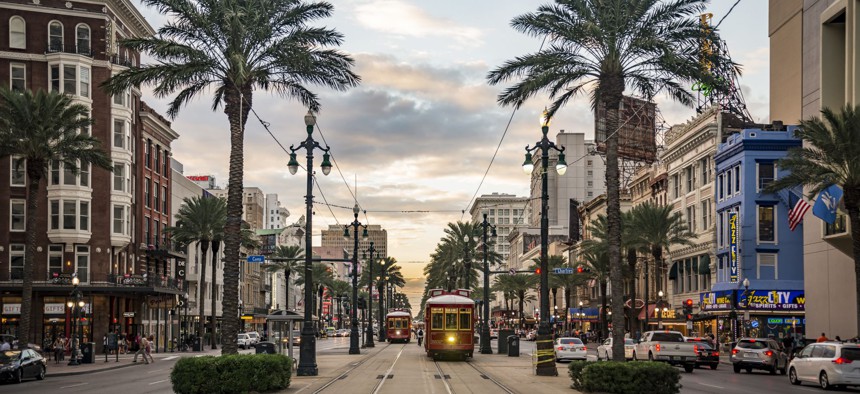Next Stop on the Route Fifty Roadshow: New Orleans

Canal Street in New Orleans, Louisiana Shutterstock

Connecting state and local government leaders
In the Big Easy, experts from across the Gulf Coast and the nation will share the changing nature of disasters and what 'Responding to Modern Emergencies' looks like.
On Tuesday, June 13, Route Fifty heads to New Orleans for the next stop on our Roadshow tour.
Mayor Mitch Landrieu will kick off our conversation, followed by federal, state, and local veterans in the field of emergency management who will give their perspective on the future of the profession.
If you’re local, we hope you’ll join us in person; if not, we'll be broadcasting a digital version of the event on June 20, which you can register for here.
I first met Mayor Landrieu in June 2010, as he was facing a man-made disaster in the Deep Water Horizon oil spill. He was only four months into his first-term as mayor, but he had invited colleagues from across the country to join him to tour the damage and have a discussion about the impact.
Landrieu was no stranger to disaster response, and knew that no one could face a major incident alone. He had served as lieutenant governor for the state in 2005 when hurricanes Katrina and Rita hit Louisiana with devastating effects. These events seem to have influenced his approach to emergency management over the last seven years—he has been a champion of acting locally, while building national and global coalitions.
Last week, as President Trump announced his intention to pull out of the Paris Agreement, Landrieu was among the voices expressing concern, calling climate change “one of New Orleans’ most urgent threats.” Landrieu has been a tireless advocate of getting New Orleans and its residents better prepared to face whatever nature or man may throw its way next; he and the city leadership have undertaken innovative efforts to make itself more resilient in response to disasters that make it in a unique class among American cities.
We’ll also explore the changing face of emergency management with leaders on the front lines at every level of government. Lee Smithson, executive director of the Mississippi Emergency Management Agency, will join Florida Emergency Division of Emergency Management’s chief information officer Richard Butgereit and Ken Graham, the National Weather Service’s meteorologist-in-charge for New Orleans-Baton Rouge to discuss the new tactics, tools and technologies that are changing their profession and how they interact with citizens.
Then, we will delve into the future of emergency communications with Ed Parkinson from FirstNet, Chris Guilbeaux from the Louisiana Governor’s Office of Homeland Security and Emergency Preparedness, and Aaron Miller, who heads the New Orleans Office of Homeland Security and Emergency Preparedness.
Over the past two decades, technology, social media, urbanization, climate change, terrorism and mass shootings have all changed not only what it means to be prepared, but the expectations citizens have for government’s response. As the face and nature of disasters themselves has changed, so has the profession. For those who are interested in getting a glimpse at the rapidly-changing emergency management landscape, how these leaders are preparing for a "whole of government response," and why we must prepare for the next emergency in new and different ways, this discussion is not to be missed.
Mitch Herckis is Senior Director of Programs for Government Executive's Route Fifty and is based in Washington, D.C.

NEXT STORY: A New U.S. 'Shadow Government on Climate Change' Emerges to Defy Trump





